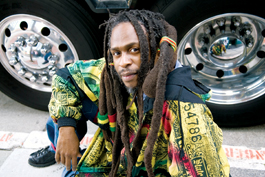home | metro santa cruz index | music & nightlife | band review

Hindsight: Rhythm guitarist and lead singer David Hinds says Steel Pulse's record labels haven't always understood where the band was coming from.
Steel This Rhythm
Steel Pulse guitarist and singer David Hinds on the past, present and future of roots reggae.
By Curtis Cartier
It's tour time for Steel Pulse. Plane tickets have been booked, backup singers hired and hotel reservations made. David Hinds is in Birmingham, England, today, but in less than two weeks he'll be in San Francisco, kicking off the latest leg of the tour. After 35 years as frontman for the iconic roots reggae set, he's got the process down to a science and is an island of calm amid a sea of last-minute preparations.
"I'm really looking forward to coming to Santa Cruz again," he says of his May 6 gig at the Catalyst. "I've been there a million times and I always love coming back."
Hinds' excitement seems genuine. It's refreshing, given the sour outlook of many musicians after decades of records, gigs and interviews. For him, despite watching 12 members--including four founders--quit, wash out or move on, and despite bitter fallouts with three major record labels, touring is still a time when it's all about the music.
"It's always been a struggle," he says in a cultured accent only slightly marred by occasional dips into the London cockney. "A lot of people still don't get what we're trying to do, you know. But on the road we can just concentrate on the music."
Steel Pulse has never been only about the music. From the group's first record, 1978's Handsworth Revolution, to its latest, 2004's African Holocaust, a rebellious political spirit and a fundamental Rastafarian message has permeated the substance of the music and the musicians. And though the group now sits comfortably as the most successful reggae act to come out of the United Kingdom, it's been a long fight to get here. "Reggae music came to the U.K. from people like us. Children of immigrants who migrated after the war," says Hinds. "Back then our music was never taken seriously. We were black Britons and we were used to getting the racial slurs in school. Venues didn't want to play us because we had a protest message."
Hinds describes the mid-'70s as one of the most trying times for his young band. A strange thing happened in the late '70s and '80s in London, however, and reggae music soon found itself championed by unlikely supporters.
"Punk rock came along around then. The punk rockers were interested in supporting anything that the system was opposing. And at that time, the system was definitely opposing reggae music," Hinds explains. "We were never really into punk, but we started to realize the similarities between reggae and punk and started playing with a lot of the bands."
Fast-forward to the present, and punk rock is all but dead. Reggae, with the passing of its prince Bob Marley in 1981, might have died also, but thanks to acts like Steel Pulse, Buju Banton, Junior Reid and the Wailing Souls, roots reggae can be now heard in everywhere from head shops to supermarkets. Hinds says he's thankful for the longevity of his music and the increasing demand, even if at times he's surprised by it.
"As far as the media was concerned, when Marley died the music was over. That wasn't so," says Hinds, his voice quickening. "People tried all kinds of new subject matters and styles to keep up the popularity. They started drifting away from the spirituality. But we've always been about deeper things, you know."
It's these "deeper things" that Hinds says Elektra, MCA and Atlantic record companies could never understand. Those companies "turned their backs on us, so we turned our backs on them," he says, and today Steel Pulse is represented by the small, reggae-only RAS label.
"Every time reggae bands were signed to a major label they were thrown into the black category or R&B. We never saw any of the money they promised," he says. "Now with the internet and pirate radio stations we get more exposure than we did with the major labels."
In Santa Cruz, Steel Pulse has had plenty of exposure. Hinds says the town is always a must-stop on any American tour, and with tickets expected to sell out, it's clear that local fans feel the same way.
"The people in Santa Cruz have been wonderful to us over the years," He says. "We feel deeply indebted to everyone there. Thanks for all the love."
STEEL PULSE plays Wednesday, May 6, at 8pm at the Catalyst, 1101 Pacific Ave., Santa Cruz. Tickets are $26 advance/$30 door. Show 16 and over. (831.423.1336)
Send a letter to the editor about this story.
|
|
|
|
|
|